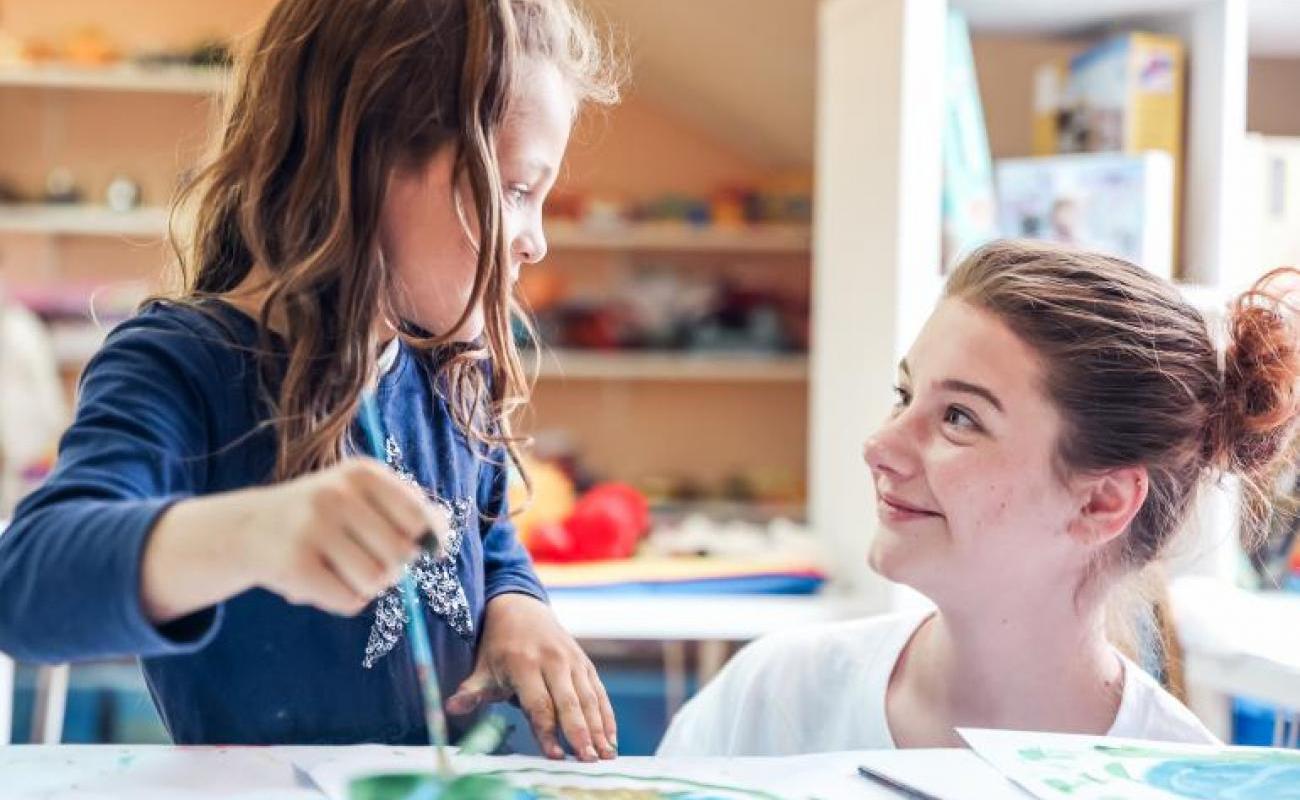Teaching practice curriculums have been changed thanks to pilot-program EU Child Guarantee
“This teaching practice is different from everything students have learned so far!”

Čakovec, September 29 2022 – Thanks to the pilot-program "Phase III: Testing the Child Guarantee in Croatia” funded by the European Union, which UNICEF is implementing together with 11 implementing partners in Međimurje County, teaching practice curriculums have been changed so students of early and preschool education at the Faculty of Teacher Education, Čakovec branch, are doing part of their teaching practice in the informal setting of Play Hubs. In addition to a formal environment such as kindergartens, students now do one-day teaching practice in Play Hubs.
It is the first time that students have had the opportunity to attend the teaching practice outside of kindergartens. Ensuring such access is very important for developing competencies and breaking stereotypes. In the Međimurje County, within pilot-program, three Play Hubs with toy libraries operate in Orehovica, Držimurec-Strelec and Kuršanec. Play hubs, in which activities are carried out by experts from The Open Academy Step by Step, provide opportunities for children's informal preschool education and learning through play, and are extremely important for children aged three to six, because in an informal environment near their home they can socialize with their peers and develop the necessary skills and knowledge for more successful inclusion in formal education.
Ahead of the new academic year, Phd Adriana Višnjić Jevtić, assistant professor at the Faculty of Teacher Education, University of Zagreb, highlighted the benefits of student practice in the informal environment of the Play Hubs:
“This teaching practice is different from everything students have learned so far because the students get a chance to meet children who are possibly coming to organized settings for the first time so it may be a little more demanding, but at the same time it gives the students wider experience. In Play Hubs students met children who come from a different background, and this helps them in developing their competencies. This kind of practice prepares students to meet the population that they usually do not meet in institutions, so it is an added value to their education”, explains Višnjić Jevtić.
First impressions by students, as well as children and parents, are extremely positive. Most would like this segment of teaching practice to be extended. Student Lucija Škremlin was mostly worried about potential language barriers as the Play hub is situated in Roma settlement, but she says: “Everything turned out really well, children are very nice, they hug us... I am also surprised how much they like drawing and painting. Children in kindergartens see it already as a routine and are not thrilled about it as children here.”
Student Anamarija Antolović, who is also doing teaching practice in a kindergarten in Varaždin, reveals that she notices a big difference between working in kindergartens and in Play Hubs, but also that, just like her colleagues, she noticed a visible improvement in her work after her experience in Play Hubs.
Silvija Oršuš, mother of four who come to Play Hub in Kuršanec expressed her content and stressed how children, apart from drawing and painting, have an opportunity to practice Croatian language while speaking with assistants. Another mother, Matea Oršuš, who comes with her kids to the same Play Hub, agrees: “When school starts and my son starts first grade, he will know everything he needs to know. He plays, draws, sings. I'm glad they come here”, says mother Matea, whose biggest wish is for her children Santiago and Tea to finish school and have good jobs. Visits to Play Hub is beneficial for her as well, as mentors give her advice on how to spend time and play with her children at home.
“This student practice is a big step forward as part of the EU Child Guarantee, because for the first-time students of the Faculty of Teacher Education come to an institution located in a Roma settlement. Personally, I am very happy that most of the students have broken the prejudices they have adopted through life, education and earlier encounters with children of the Roma national minority, and have expressed their desire to continue coming here", says Marijana Sabo, mentor at the Play Hub in Kuršanec and a member of the Médecins du Monde team.
"Phase III: Testing the Child Guarantee" is funded by the European Union and is implemented in seven European Union countries[1] to ensure access to basic services such as health care, education, quality nutrition, quality housing and care services for children growing up in the most difficult circumstances. The Republic of Croatia was given the opportunity to model the EU Child Guarantee in cooperation with the European Commission and UNICEF to address child poverty and social exclusion. This pilot-programme is aimed primarily at children with disabilities, children living in a precarious family environment and children from national ethnic minorities. It is implemented in seven municipalities of Medjimurje County, and through cooperation and knowledge of implementing partners interventions are taking place in three areas: integrated child protection services and family support, early intervention services and access to quality preschool education.
[1] The seven pilot countries are: Bulgaria, Croatia, Germany, Greece, Italy, Spain and Lithuania.
